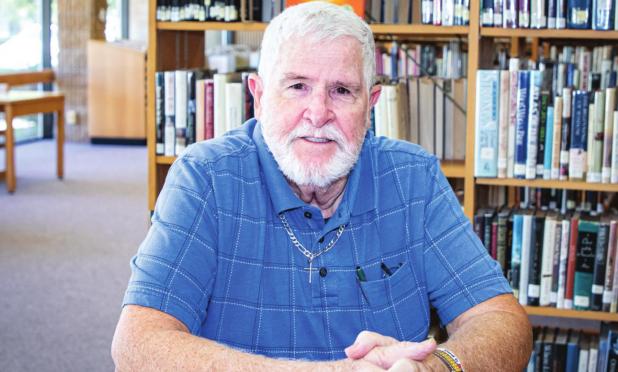
Vets helping vets
U.S. Air Force veteran Doug Magneson spends his Tuesdays and Wednesdays helping other veterans through another battlefield – the often-impenetrable bureaucracy of claiming benefits earned from serving as an active duty member of the U.S. military.
As Young County Veterans Services Officer, Magneson acts as a liaison between veterans and their families and caregivers and the agencies that provide them benefits, including the U.S. Department of Veterans Affairs and the U.S. Veterans Affairs. Magneson made it clear he does not work for the V.A.; he works as a go-between helping veterans wade through what he describes as an aggravating system of paper work and rating systems. He holds his “office hours” in the Olney Community Library & Arts Center on the first Tuesday of each month between 10 a.m. and noon
Magneson retired from the Air Force with a rank of sergeant, spending time in Vietnam and in Europe in the late-60s to mid-70s. After active duty, Magneson went to work for the U.S. Department of Defense until retiring in San Antonio. Magneson confessed that he did not want to spend his retirement in San Antonio and started taking weekend trips on his motorcycle to explore small country towns. He hoped to find a new hometown where he could enjoy retirement. Magneson says when he came to Graham, he knew he had found the place he would call home.
His “retirement” includes traveling to towns in Young County, meeting two days a week with veterans with questions about everything ranging from medical issues to legal and financial services to jobs opportunities for veterans. The Enterprise visited with Magneson to find out what kinds of issues he deals with and how he can help Olney vets.
“My purpose is, when a veteran comes in and they had a disability and were in the military, if we can find a service connection to that disability, it ups their chances that we can get them a Veterans Affairs disability rating,” Magneson said.. “Now once we get a Veterans Affairs disability rating, then the Veterans Affairs determines how bad it is, how aggravated it is and they determine the rating percentage. Percentages go from 10 percent to 100 percent. When a veteran comes in, we talk and visit, I find out what his background was, what he did in the military, everything like this. For example, if he jumped out of perfectly good airplanes, I can’t help that, But, if he had a disability, we tried to see if it’s eligible. Not every veteran is going to be able to be helped, because not every veteran who has a disability or physical disease had it caused while serving.”
Magneson said veterans generally do not discuss mental issues related to serving in the military. “It just is not talked about,” mostly because it is intensely personal, he said. Magneson said if mental health issues are talked about it is only to fellow veterans, because they are the only ones who will grasp that unique experience. Magneson said it is a great deal tougher to convince the Veterans.Administration of mental disability associated with serving in the U.S. military.
Magneson added that in addition to meeting at the OCLAC, veterans could contact him at 618-623-8624 for questions or if they just needed someone to talk to. Magneson closed the interview by saying he was brought to Olney because God inspired him to do this work and is a part of a prison ministry as well.
